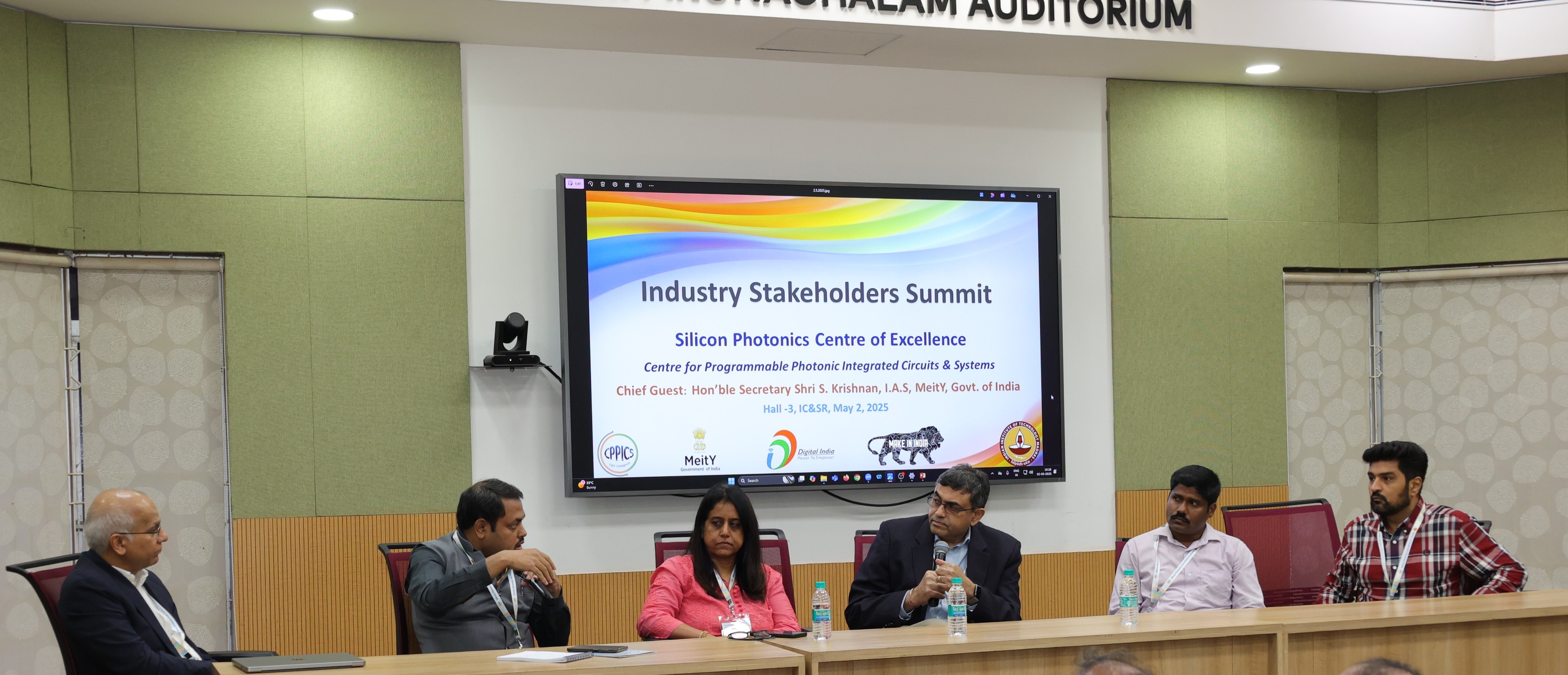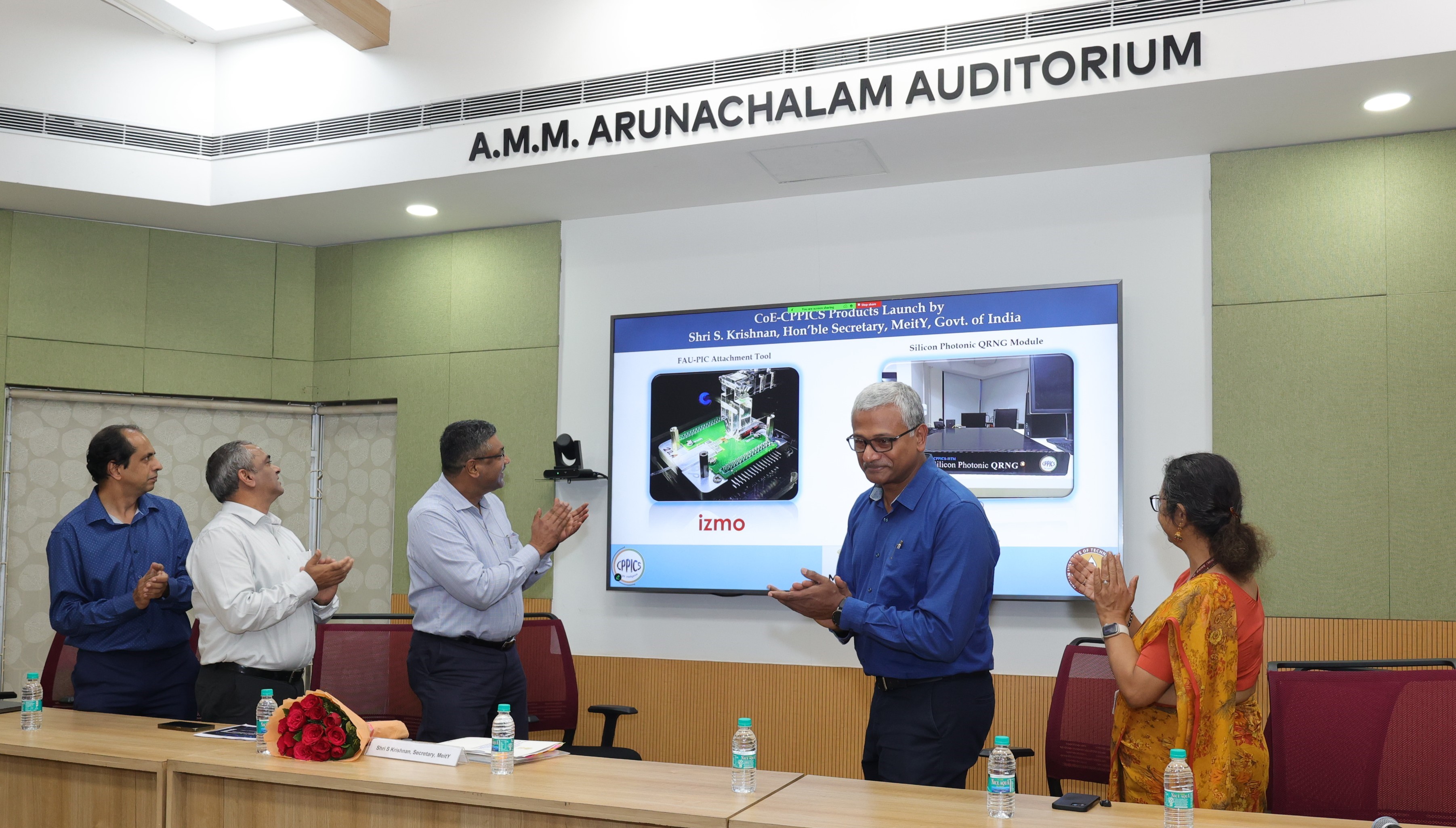Special Service and Features
MeitY Secretary Mr. S. Krishnan, IAS, launches Silicon Photonics products indigenously developed at CoE-CPPICS IIT Madras
Posted On:
03 MAY 2025 2:30PM by PIB Chennai
Shri S. Krishnan, Secretary, Ministry of Electronics and Information Technology (MeitY), Government of India, launched two Silicon Photonics products designed and developed indigenously at CoE-CPPICS at Indian Institute of Technology Madras (IIT Madras)
Mr. Krishnan launched the products on eve of its industry stakeholders meeting, jointly convened by the Chief Investigator Prof. Bijoy Krishna Das and the MeitY Scientist Project-in-charge Dr. Sankha dip Das at the IIT Madras Campus on Friday (2nd May 2025).

The CoE-CPPICS at IIT Madras is a unique place in India which follows Product Research Development and Manufacturing Model by leveraging CMOS fabrication process compatible silicon photonics technology.

The mission of the Centre is to build capacity in all verticals of silicon photonics product manufacturing eco-system through focused R&D and nurture Indian photonics industry for immediate needs in domestic and international markets.
The Two Products launched during the occasion include:
1. Fiber-Array Unit (FAU) Attachment Tool for Photonic Chip Packaging
The team CoE-CPPICS have developed a novel state-of-the-art Fiber Array Attachment Tool in consultation with M/s Izmo leaderships and engineers, which could be seamlessly integrated with Izmo’s packaging facility for nextgen Photonics Chip Packaging. The world class packaging facility at izmo Microsystems is now commercially available for miniaturized silicon photonics product development.
2. Silicon Photonic QRNG (Quantum Random Number Generator):
The second product that has been launched is a high-speed silicon photonics QRNG (Quantum Random Number Generator). It has been shown with a live demonstration that the product was successfully deployed at SETS (Society for Electronic Transactions and Security) Chennai; the SETS scientists and engineers integrated CPPICS QRNG Module into its secured server for customer services.
The QRNG module will be available commercially for potential customers through the CPPICS spin-off start-up “LightOnChip Pvt. Ltd.” The key applications of QRNG are: IT security for military and defence, Cryptographic algorithms, Quantum key distribution (QKD), Scientific Modelling & Simulations, Financial transactions/ Blockchain/ OTP, Gaming Applications
Congratulating CoE-CPPICS on these two products, Mr. S. Krishnan, IAS, Secretary, MeitY, Government of India, said, “Indigenously developed field deployable silicon photonic-based quantum random number generator (QRNG) module is pride for India. The product has been delivered to DRDO to help in advanced quantum cryptography.”
Speaking earlier, Prof. V. Kamakoti, Director, IIT Madras, said, “Silicon Photonics is an emerging technology that will certainly help design much more efficient and complex hardware for the future. I am very happy that the Silicon Photonics CoE-CPPICS Centre at IIT Madras has now come out with demonstrable products that can be quickly adopted by the market. We hope that multiple such products will continue to come in the future.”
The Silicon Photonics CoE-CPPICS also organized an Industry Stakeholders Meeting at the campus today (2nd May 2025), which was chaired by Mr. S. Krishnan.
Highlighting the importance of these two product launches to the country, Prof. Bijoy Krishna Das, Chief Investigator, Silicon Photonics CoE-CPPICS, IIT Madras, said, “We are now fully equipped with the entire value chain of silicon photonics product development by leveraging the strongest silicon photonics research team and the world class silicon photonics chip design and testing facility at CPPICS along with its state-of-the-art Silicon Photonics Foundry Partner Silterra Malaysia, and Photonic IC Packaging Partner izmo Microsystems”.
Prof. Bijoy Krishna Das added, “The unique value chain created around CPPICS is now ready for handholding emerging photonic start-up companies in India and elsewhere in the World for their product prototyping and manufacturing; the estimated market for silicon photonics product is going to reach USD 10 billion by 2030.
Prof. Bijoy Krishna Das further emphasized, “I believe the QRNG product launched today is the first silicon photonics product from India, which has been already deployed at SETS Chennai successfully for commercial services. This is a humongous success of silicon photonics research in India, which has been possible because of a brilliant team effort by a determined group of young research scholars and engineers at CPPICS; dedicated team of izmo Microsystems engineers for their IC packaging support, and scientists from SETS Chennai for use-case system integration; the entire credit goes to all of them. We are grateful to the Ministry of Electronics and Information Technology, Govt. of India for financial support in establishing CoE-CPPICS at IIT Madras for silicon photonics research and cutting-edge product development, right here in India!”
Smt. Sunita Verma, Group Coordinator and R&D Head, MeitY, Mr. Dinanath Soni, Executive Director, izmo Microsystems, and Mr. Thung Beng Joo, Vice President, SilTerra Malaysia Sdn. Bhd., also spoke on the occasion elaborating their ongoing R&d commitments with CPPICS and future roadmaps
Photonic packaging and assembly is a complex and multi-disciplinary design and manufacturing process. To make a PIC-enabled module perform according to specification, sub-micron precision alignment and bonding process are required. At the same time, precise thermal management is required to maintain the thermo-optic stability of the signals.
IIT Madras collaborates with izmo Microsystems, a Bangalore-based company that works in the development of packaged integrated circuits, to overcome the existing limitations.
SilTerra, Malaysia, is the Silicon Photonics foundry partner, for this centre. IIT Madras is committed to joint R&D on Silicon Photonics technology and various applications. The CoE-CPPICS will contribute with component design, characterizations and compact modelling towards Process Design Kit block development.
The immediate focus of CoE-CPPICS, IIT Madras, is to provide better solutions for microwave and quantum photonics applications such as advanced photonic processors to be used in high-performance RF transceivers, scalable linear optical quantum computing processors for the next-generation qubit computation, and chip level quantum key generation and distribution circuits, etc.
CPPICS is actively developing indigenous PIC design rules and hardware infrastructure for precision packaging for system-level applications.
***
PLM/RJ
(Release ID: 2126449)
Visitor Counter : 563